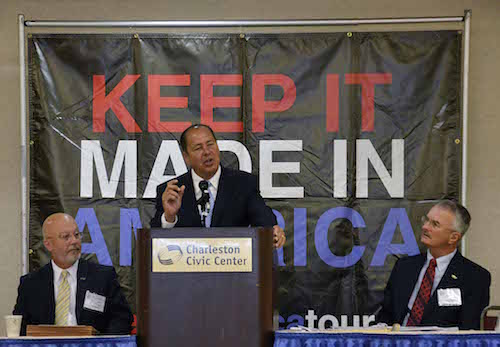Six IBEW locals with jurisdiction in West Virginia will be among the plaintiffs in a suit challenging the constitutionality of the right-to-work law passed by the state’s Republican-controlled General Assembly earlier this year over Gov. Earl Ray Tomblin’s veto.
The state AFL-CIO informed West Virginia Attorney General Patrick Morrisey of their intent to sue in a letter dated May 5. Such a letter is required by West Virginia law 30 days prior to a suit being filed against the state.

|
West Virginia Governor Earl Ray Tomblin speaks at a meeting of the state’s AFL-CIO convention in 2012.
Photo provided under a Creative Commons agreement by the governor’s office
|
The locals planning to file suit are Wheeling Local 141, Huntington Local 317, Charleston Local 466, Clarksburg Local 596 and Parkersburg Local 968. Cumberland, Md., Local 307, which has jurisdiction in parts of West Virginia, also will be a plaintiff. Other parties filing the advance notice are the West Virginia State Building & Construction Trades Council; United Mine Workers of America; and Teamsters Local 175 in Charleston.
“They fast tracked this and drafted a real shoddy bill,” said Dave Efaw, a former Charleston Local 466 business manager who is now secretary/treasurer of the state’s building trades. “That’s why we’re finding mistakes.”
Right-to-work laws allow employees to opt out of paying membership dues, even when they receive the benefits of a union contract, and it prohibits companies from encouraging them to join a union. They have been enacted in 26 states and harm working families by driving down wages and often leading to unsafe working conditions.
Republicans control both the West Virginia House and Senate for the first time since 1930 and made passing a right-to-work law their top priority during this year’s legislative session. The opening day usually is reserved for ceremony and the governor’s state of the state address. But this year, Republicans used it to introduce Senate Bill 1, the right-to-work law. Senate President Bill Cole, the Republican nominee for governor, was a co-sponsor.
Opening day was Jan. 13. The legislature overrode Tomblin’s veto on Feb. 12. Only a simple majority was required to do so.
“They were determined not to work on anything until that was done,” current Charleston Local 466 Business Manager Joe Samples said. “They also made sure it only went through one committee. That was really unusual. It usually goes through two or three committees.”
The suit is expected to challenge the law primarily on two grounds. The first is that forcing unions to represent employees who refuse to pay union dues is an illegal taking of property under state law. A circuit court judge in Wisconsin found that state’s right-to-work law unconstitutional last month on the grounds that forcing unions to provide representation to members who don’t pay dues was an unlawful seizure of property. The state’s attorney general has filed an appeal.
“When someone decides they’re not going to pay their union dues, that means someone else is paying that person’s share,” Samples said. “The way we interpret the [state] constitution is that’s taking away property and giving it to someone else.”
The plaintiffs also are expected to argue the law only applies to collective bargaining involving public employee unions, pointing to a portion that defines the state as “any officer, board, branch, commission, department, division, bureau, committee, agency, authority or other instrumentality of the state of West Virginia” and not citing any private employer definitions.
“We feel like they exempted construction from this so-called workplace freedom bill and didn’t realize that,” Efaw said.
Plans of the lawsuit spurred an editorial from the Charleston Gazette-Mail, the state capital city’s newspaper, with the headline “Legislative Incompetence?”
“So far, Republicans who control the legislature have shown an inability to govern because they can’t raise enough revenue to keep the state government solvent,” read part of the editorial. “It will be ironic if another botch mars their foremost accomplishment.”
Samples and Efaw both noted the West Virginia right-to-work law is almost identical to right-to-work laws passed in recent years in both Indiana and Wisconsin. That’s a sign it was largely written by interests from outside the state, particularly the arch-conservative American Legislative Exchange Council, they said. ALEC is comprised of conservative politicians and business representatives who write and model laws for right-wing legislators around the country.
The West Virginia suit will be filed in Kanawha County Circuit Court. Samples said he’s optimistic about its success at that level, but expects it to eventually be heard by the West Virginia Supreme Court. The state held its first-ever non-partisan Supreme Court election on Tuesday, but a candidate aided by $3 million donated from conservative groups mostly from outside the state won the one available seat.
The West Virginia Legislature also repealed the state prevailing wage laws during this year’s session. Prevailing wage laws require contractors doing business with governmental bodies to pay their workers at pre-determined levels.
Home page photo credit provided under a Creative Commons agreement by Michael Hicks